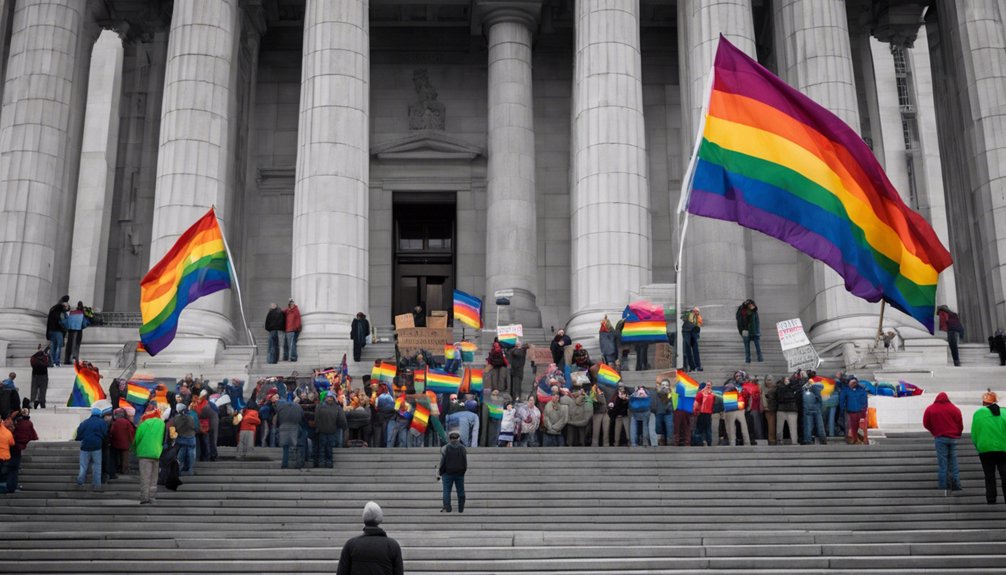Idaho Lawmakers Push New Bill to Challenge Same-Sex Marriage Rights


Table of Contents
ToggleMany people might not know that despite increasing support for same-sex marriage in Idaho, a new resolution is aiming to ban it. Republican Rep. Heather Scott has introduced this measure, challenging the Supreme Court’s decision that legalized gay marriage nationwide. This move highlights a clash between Idaho’s conservative lawmakers and its changing public views. While nearly half of Idahoans now favor legal same-sex marriage, political efforts seem to push in the opposite direction. What does this mean for the future of LGBTQ+ rights in Idaho, and how could this affect other states?
In Idaho, legislative efforts to challenge same-sex marriage have gained momentum with a new resolution introduced by Republican Representative Heather Scott. This resolution targets the 2015 Supreme Court decision in Obergefell v. Hodges, which legalized same-sex marriage across the United States. The resolution argues that the Obergefell ruling overstepped judicial authority, advocating for a return to the traditional definition of marriage as a union between one man and one woman.
The resolution seeks to assert state authority to regulate marriage, suggesting that such matters should be decided at the state level rather than by the federal judiciary. Although the resolution is symbolic and carries no legal force, it aims to influence the broader national conversation on marriage rights and potentially encourage the U.S. Supreme Court to reconsider its stance on the issue.
Despite its symbolic nature, the resolution has gained significant support. The House State Affairs Committee in Idaho voted unanimously to advance it for further consideration. This move highlights the ongoing legislative challenges faced by same-sex couples in Idaho. The resolution reflects a divide in public opinion, with nearly half of Idahoans supporting legal same-sex marriage and 37% opposing it.
Recent legislative moves in Idaho to challenge same-sex marriage rights bring attention to shifting public opinion in the state. Over the past two decades, public sentiment in Idaho has transformed. Back in 2006, 63% of Idahoans voted to ban same-sex marriage. However, a fall 2022 poll reveals a significant change, showing that nearly half of Idahoans now support legal same-sex marriage, with only 37% opposed and 14% undecided.
This shift reflects broader national trends. Gallup polls indicate strong national support for marriage equality, even though conservative support has slightly dipped below 50% recently. The landmark Obergefell decision in 2015, which legalized same-sex marriage nationwide, played an essential role in this change by normalizing marriage equality and encouraging acceptance across states, including Idaho.
Despite recent legislative efforts to overturn the Obergefell decision, the growing acceptance of LGBTQ+ rights presents challenges to such initiatives. As public opinion continues to evolve, Idaho’s shifting public opinion could influence political decisions, highlighting a divide between legislative actions and the views of many Idahoans. The ongoing conversation about marriage equality in Idaho underscores the significance of aligning laws with the changing perspectives of its residents.
Despite the changing public opinion in Idaho, conservative political dynamics remain steadfast, as demonstrated by the legislature’s actions. The Idaho legislature, controlled by a Republican supermajority, has introduced a resolution challenging gay marriage. This resolution, backed by Rep. Heather Scott, argues that the 2015 Supreme Court decision, Obergefell v. Hodges, overstepped federal authority by legalizing gay marriage nationwide. The push for this resolution shows a strong desire among Idaho lawmakers to have the Supreme Court reverse this landmark ruling.
The resolution has gained unanimous support in the House State Affairs Committee, reflecting a unified stance among Republican legislators, despite public opinion being nearly split on the issue. This dynamic illustrates the tension between conservative lawmakers and a shifting public sentiment that is increasingly supportive of gay marriage.
Conservative justices appointed under former President Donald Trump have encouraged hopes among Idaho Republicans to revisit and potentially overturn the Obergefell decision. These judicial changes have sparked renewed efforts to challenge same-sex marriage laws, highlighting the ongoing struggle between evolving public attitudes and steadfast conservative political actions in Idaho.
While media and cultural influences play a significant role in shaping public opinion, Idaho’s struggle with same-sex marriage reflects a broader national discourse. The state’s legislative efforts to challenge marriage equality are at odds with a growing cultural change. For instance, recent polls show that nearly half of Idahoans now support legal same-sex marriage, highlighting a shift in public attitudes.
This cultural change is part of a wider national trend towards acceptance, as seen with the Respect for Marriage Act passed in 2022. This act requires states to recognize same-sex marriages, underscoring a move towards inclusion despite Idaho’s decision to pursue restrictions. The media’s role in these developments cannot be understated, as it brings national attention to the issue and influences public sentiment.
Key points to reflect on include:
These elements reflect how media and cultural forces impact both legislative decisions and public perceptions in Idaho and across the nation.

As Idaho faces political challenges to LGBTQ+ rights, the future of these rights remains uncertain. The state’s legislative session features a proposed resolution aiming to overturn the 2015 landmark decision, Obergefell v. Hodges, which legalized same-sex marriage across the United States. This proposal seeks to affirm state authority over marriage laws and return to a natural definition of marriage. However, this move could jeopardize the future protections for same-sex couples in Idaho and beyond.
Despite legislative efforts, public opinion in Idaho shows nearly half of the residents support legal same-sex marriage. This shift suggests a growing acceptance, even as political leaders push for changes. The Respect for Marriage Act, passed in December 2022, guarantees existing same-sex marriages are recognized but does not assure future protections, leaving many couples uncertain about their rights.
If Obergefell is overturned, same-sex couples may face new challenges, needing legal measures like prenuptial agreements and confirmatory adoptions to safeguard their families. The Republican supermajority in Idaho’s political landscape raises concerns about the potential rollback of LGBTQ+ rights, highlighting the need for continued advocacy and vigilance to protect these hard-won rights.
In Idaho, gay marriage isn’t banned. It has been legal since 2014 after a federal court ruling. The 2015 Supreme Court decision, Obergefell v. Hodges, further supported this by legalizing same-sex marriage nationwide. However, Idaho’s legislature is trying to challenge this with a symbolic resolution to overturn the decision. Despite this push, many Idaho residents support marriage equality, reflecting a divide between public opinion and legislative efforts.
As of now, same-sex marriage is a colorful tapestry woven across all states in the United States, thanks to the Supreme Court’s landmark decision in 2015. The court’s ruling in Obergefell v. Hodges guaranteed marriage equality nationwide. Despite some states like Idaho trying to challenge this, the law remains unchanged. This legal victory paints a hopeful picture for love, reminding everyone that love knows no boundaries or limitations.
In Florida, gay marriage isn’t banned. It’s been legal since 2015 when the U.S. Supreme Court’s Obergefell v. Hodges decision legalized same-sex marriage across the nation. Although Florida once had a constitutional amendment defining marriage as between a man and a woman, it was overturned. Public opinion has shifted positively, with most Floridians now supporting marriage equality. Advocacy groups remain vigilant against any potential threats to LGBTQ rights in the state.
If Obergefell is overturned, it would be like opening Pandora’s box for same-sex marriage rights. States would reclaim the power to define marriage, leading to a patchwork of laws across the U.S. Existing marriages could stay recognized, but future unions might face hurdles. This shift could spark a domino effect, eroding other LGBTQ rights. Communities would rally to support affected individuals, emphasizing the importance of legal protections and advocacy.
As Idaho grapples with its own identity, the clash between conservative lawmakers and a more accepting public resembles a tug-of-war. Despite nearly half of Idahoans supporting same-sex marriage, legislative moves to ban it highlight the deep-rooted political traditions at play. The future of LGBTQ+ rights in Idaho hangs in the balance, influenced by shifting societal views and steadfast political forces. Media and cultural voices will continue to shape this evolving narrative, echoing change through the state.
 News and AdvocacyNovember 14, 2025Rainbow Victories: 2025’s Most Pro-LGBTQ+ States Revealed
News and AdvocacyNovember 14, 2025Rainbow Victories: 2025’s Most Pro-LGBTQ+ States Revealed News and AdvocacyNovember 14, 2025Transgender Sanctuary States: Protecting Rights, Providing Hope
News and AdvocacyNovember 14, 2025Transgender Sanctuary States: Protecting Rights, Providing Hope Featured PostsNovember 13, 2025When Restroom Policing Backfires: The Hotel That Went Too Far
Featured PostsNovember 13, 2025When Restroom Policing Backfires: The Hotel That Went Too Far Featured PostsNovember 13, 2025Sex, Safety, and Seduction: A Trans Girl’s Guide to Hookups
Featured PostsNovember 13, 2025Sex, Safety, and Seduction: A Trans Girl’s Guide to Hookups